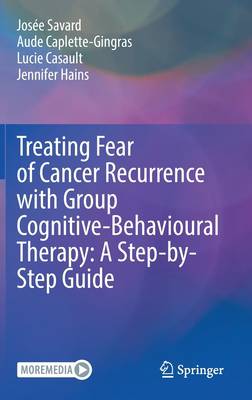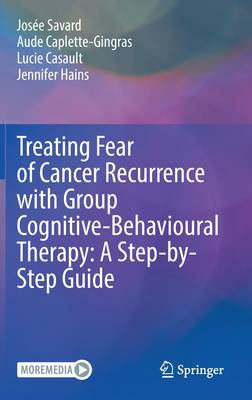
- Retrait gratuit dans votre magasin Club
- 7.000.000 titres dans notre catalogue
- Payer en toute sécurité
- Toujours un magasin près de chez vous
- Retrait gratuit dans votre magasin Club
- 7.000.000 titres dans notre catalogue
- Payer en toute sécurité
- Toujours un magasin près de chez vous
Treating Fear of Cancer Recurrence with Group Cognitive-Behavioural Therapy: A Step-By-Step Guide
Josée Savard, Aude Caplette-Gingras, Lucie Casault, Jennifer Hains
Livre relié | Anglais
94,95 €
+ 189 points
Format
Description
Therapist Manual Patient ManualIntroduction- Welcoming and introduction ofleaders- Authors and format of theprogram- Participants' introduction- Goals of the programInformation about Fear of CancerRecurrence (FCR)- Definition- When is FCR normal or not?- Characteristics associated withFCR- Vicious circle of FCRInformation about Fear of CancerRecurrence (FCR)- Definition- When is FCR normal or not?- Characteristics associated withFCR- Vicious circle of FCRBeliefs about the Influence ofPsychological Factors on Cancer- Does stress cause cancer?o Research evidenceCan Thoughts Influence Cancer?- Beliefs about the influence ofpsychological factors on cancer- Multifactorial model of cancer4o Multifactorial model ofcancer- Can the power of thought curecancer?o Research evidence- Does stress cause cancer?- Does thought have the power tocure cancer?- Can positive thinking help youcope with cancer?The Cognitive Model of Emotions The Cognitive Model of Emotions- Cancer: A distressing experience- The cognitive model andadjustment to cancerThe Benefits of Realistic Thinking- The tyranny of positive thinking- Realistic thinking and cancero Analogy with glasseso EffectsThe Benefits of Realistic Thinking- The tyranny of positive thinking- Fighting cancer?- Dark, rose-coloured, or clearglasses?- Realistic thinking and cancerCognitive-Behavioral Therapy- Definition- Research evidenceIdentification of Negative ThoughtsExerciseEnd of Session Discussion SummarySession 2Therapist Manual Patient ManualContent of the SessionFeedback on Last Treatment SessionFeedback on ExerciseCognitive Restructuring- The case of Elise- Socratic questioningCognitive Restructuring- The 5-column grid- Socratic questioningRealistic Interpretation of SomaticSymptoms- Using four objective criteria- Finding balance between neglectand hypervigilanceRealistic Interpretation of SomaticSymptoms- Using four objective criteria- Finding balance between neglectand hypervigilanceInformation-Seeking Profiles- Seeking the right amount ofinformation and from validsourcesInformation-Seeking Profiles- Seeking the right amount ofinformation and from validsourcesRealistic Interpretation of Probabilitiesand Statistics- Risk of recurrenceRealistic Interpretation of Probabilitiesand Statistics- Risk of recurrence5- Survival rate- Risk reduction with treatment- Survival rate- Risk reduction with treatmentCognitive Restructuring ExerciseEnd of Session Discussion SummarySession 3Therapist Manual Patient ManualContent of the SessionFeedback on Last Treatment SessionFeedback on ExerciseIntolerance of Uncertainty- Cancer = Uncertainty- Learning to better tolerateuncertaintyIntolerance of Uncertainty- Cancer = Uncertainty- Possible to be happy withoutbeing certain that cancer will notcome back?
Spécifications
Parties prenantes
- Auteur(s) :
- Editeur:
Contenu
- Nombre de pages :
- 253
- Langue:
- Anglais
Caractéristiques
- EAN:
- 9783031071867
- Date de parution :
- 03-12-22
- Format:
- Livre relié
- Format numérique:
- Genaaid
- Dimensions :
- 156 mm x 234 mm
- Poids :
- 557 g







